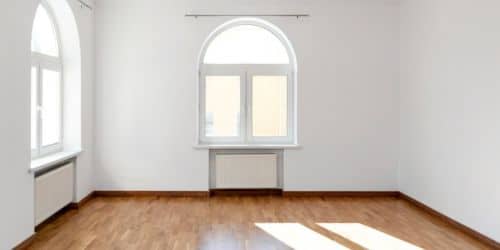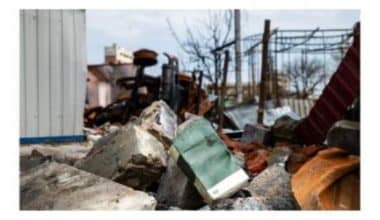Vacant home insurance coverage protects houses that are not occupied and do not contain the personal belongings of their owners. This kind of insurance might be something you need if you own a home that is left unoccupied for whatever reason. Vacant properties are more vulnerable to natural disasters, burglary, and vandalism, all of which drive up the cost of vacant home insurance coverage. The vacant home insurance policy endorsement from State Farm is good for a full year. Most insurers will provide coverage for a home while it is vacant; however, many factors will determine which policy is ideal for you.
Vacant Home Insurance
Your standard homeowner’s insurance will not cover a vacant property. If you own a home that is currently unoccupied because it is up for sale, being renovated, or is otherwise not in use regularly, you should consider purchasing a vacant home insurance policy. The amount of time that must pass before an insurance company recognizes a home as vacant varies widely between providers. It could take anywhere from 30 to 60 days.
Insurance for vacant homes can be acquired separately or as an addition to an already-existing homeowners policy. It is meant to safeguard properties that will be sitting empty for a while. This is not the same as standard homeowners insurance, which protects you for the duration that you own and occupy the home.
Insurers make a distinction between unoccupied and vacant properties. If you still have your furniture and other belongings inside your home, it is not considered vacant but rather unoccupied.
Who needs Vacant Home Insurance?
It is rare to need vacant home insurance unless your home will be unoccupied for an extended period. Some examples of when you might need insurance on a vacant house are:
- Landlords between tenants
- Homeowners who sell their houses after moving out
- House flippers
- Having a vacation home that is empty during the off-season
- Doing major repairs or renovations to a house that make it temporarily unlivable
- Long-term hospitalization for medical care
- Having a second home that you only visit a few months per year
- If you are away from your home for an extended period, whether because of military service or vacation, you should consider purchasing vacant home insurance. Keep in mind that if you want your home to be considered vacant, you will need to remove all of your belongings from it.
Vacant Home Insurance Coverage
You can purchase a separate policy specifically for a vacant home, or you can add a vacant dwelling endorsement to your current homeowner’s policy. Vacant home insurance policies can differ considerably in terms of their coverage limits, the events they cover, and the costs involved.
In comparison to a home that is occupied full-time, a vacant house poses a greater risk to insurance companies. This is because it is more likely that vandalism-related damages or other mischief could happen when no one is around to watch over the property. Additionally, there is a higher chance of fire and water damage if routine maintenance and upkeep are neglected.
What does it cover?
A typical vacant home insurance policy frequently covers the following perils, but each insurance provider may have a different list, so make sure to check your policy to be sure:
- Aircraft
- Explosions
- Fire
- Hail
- Lightning
- Riot or civil commotion
- Smoke
- Vehicles
- Volcanoes
- Windstorm
- Theft
- Vandalism
- Wind
Both the hazards that are covered and those that are not should be detailed in your policy. Insurance for a vacant home can protect you from some, but not all, of the risks associated with leaving your home unoccupied. Your insurance provider may have strict guidelines for the kinds of homes they will cover.
How to Get Vacant Home Insurance
Insurance for a vacant home can take many forms. Here are some ways to obtain insurance for a vacant home, though your options may vary depending on your insurer.
- Home insurance endorsement. Some insurance companies offer an endorsement that adds coverage for vacant periods to the standard home insurance policy. Safeco, for instance, provides an endorsement for vacant homes.
- Stand-alone vacant home insurance. Vacant homes can qualify for specialized coverage from some insurers. Companies like American Family, American Modern, Foremost (a division of Farmers), and VacantExpress offer separate policies for vacant homes.
- Policy surcharge. Some insurance companies will add a surcharge to your premium once they determine that your home is vacant. AIG Private Client Group, for instance, might tack on a 25% vacancy surcharge, while PURE would only add an extra 20%.
Cost of Vacant Home Insurance
The cost of insurance for a home that is vacant can also differ widely depending on your insurer and the specifics of your policy.
Insurance companies place a higher premium on vacant properties because there is no one to spot small problems before they become major disasters. A person at home can prevent a fire from spreading and a thief from breaking in. According to Fit Small Business, the cost of vacant home insurance can be anywhere between $50 and $150% higher than that of insuring an occupied one. Factors such as the property’s age, location, and length of time on the market all play a role in determining the premium.
When determining premiums and eligibility, insurers look at several factors, including the home’s current use, the reason for any periods of vacancy, the home’s age, the condition it is in, and its estimated replacement value. An older home or one that was not properly maintained before your purchase may increase your risk profile, resulting in higher insurance premiums if you need to insure it while it is vacant. Getting insurance quotes from multiple providers increases the likelihood of finding a policy with a reasonable premium.
Factors that Affect Vacant Home Insurance Cost
Insurance companies may base the cost of covering a vacant home on factors such as:
- Age of the house
- Cause of the vacancy
- Condition of the property
- Length of vacancy
- Location
- Proximity to a fire station
- Security systems are in place
You can lower the insurance premium for a vacant home by taking measures to lower the risk associated with the property. Insurance companies often provide discounts to policyholders who take safety precautions like installing smoke alarms, CO detectors, and/or a security system. Your premiums may go down if you hire someone to take care of your lawn and garden or perform routine maintenance checks on your house.
Best Vacant Home Insurance
A lot of insurers will let you add coverage for a vacant home as an endorsement to your existing homeowner’s policy. A standalone policy may be available from certain providers. The homeowner’s insurance you currently have may include a rider or endorsement for vacant home coverage. State Farm, Farmers Insurance, Foremost (a Farmers Insurance company), and American Family Insurance are just a few of the many insurance providers who will insure a vacant home.
We have highlighted some of the best insurance providers in the country below that specialize in insuring vacant and unoccupied homes.
#1. American Family
The American Family Insurance Company provides all-inclusive home insurance for both Airbnb properties and vacant homes, but they are only available in 19 states. American Family Insurance offers optional riders to their policies that, in addition to the standard vacancy provision, cover things like detached structures and landscaping equipment. Depending on the homeowner’s needs, insurance policies can be purchased for anywhere from three to twelve months. Individuals can add personal property coverage to a vacant home insurance policy to protect things like snowblowers and lawnmowers while you store them away.
#2. American Modern
You can find home and car insurance from American Modern in all 50 states. The National Association of Insurance Commissioners (NAIC) reports that there are fewer complaints than in the country as a whole. AM Best gives Munich Re, whose American Modern Insurance division is a part of AM Best, an A+ (superior) rating.
Since its two policies are tailored to vacant homes specifically, American Modern Insurance is the best insurance provider for unoccupied properties. It is financially stable, offers customizable insurance plans, and makes it easy to monitor your policy and file claims via a user-friendly online portal. American Modern provides two options for obtaining a quote: entering your address online and connecting with a local agent or calling the company directly. There is no online quote availability.
There are two options for vacant home insurance that American Modern provides:
This short-term policy is for landlords who have an unexpected vacancy or for investors who are making repairs to a rental property. This is a regular homeowner’s policy that covers the usual risks and costs, including open peril and replacement. There is another kind of vacant home insurance for houses that will sit empty for a while. This policy is simpler; it only covers physical assets and gives the actual cash value of replacing them instead of the replacement cost.
You can find American Modern anywhere in the United States. If your building is smaller than a four-family home and worth less than $500,000 in most states, you may qualify for vacancy coverage from this company for up to a year. Some of the perils includes Fire, lightning, wind, hail, etc. When resolving claims, American Modern uses the item’s “actual cash value,” which takes into account any depreciation that may have occurred since the loss.
#3. Farmers
Farmers Insurance is one of the most trusted names in insurance and has been serving customers all over the country for decades. It provides a hybrid solution in the form of vacant home insurance, which is available to both landlords and homeowners. When a tenant moves out and you need to switch from landlord to vacant coverage, or when you go away for an extended period and leave your home unoccupied, it is simple to make the transition.
An agent will follow up with you after you request a quote through the Farmers’ website, over the phone, or via the Farmers’ agent locator service.
Unfortunately, Farmers does not provide much information about the specifics of its coverage for vacant homes. However, if you are planning on being away from your home for more than a year, they offer a vacant home insurance policy. This policy lets you pay in several ways, and you can cancel at any time.
Nearly no complaints about homeowners’ insurance and none about commercial property and liability insurance have been filed with the NAIC, demonstrating the company’s excellent customer service.
#4. Foremost
Farmers Insurance Group includes the nationwide provider Foremost Insurance. By aiding policyholders with the application and cancellation processes, Foremost Insurance streamlines the ordeal of securing insurance. And it gets better: they pay back the homeowner the cancellation fee they originally paid. In addition, Foremost offers policy renewals for homeowners for up to an additional four years.
Foremost is a subsidiary of the Farmers Group. AM Best has given Farmers an A+ (excellent) rating. Foremost provides insurance for both individuals and businesses and its vacant insurance policies can be used for either type of business. The discounts that it provides to clients make it the greatest. Among the major savings for property owners are:
- Multi-dwelling: Available if you have Foremost insurance on more than one property.
- Multipolicy: If it includes bundling more than one kind of insurance, like home and car insurance.
- House age: In the case of newer homes
You can get a quote by calling the service provider directly or talking to a Foremost-affiliated agent. Foremost also provides online forms for requesting pricing information.
Vacant home insurance from this company covers a lot of different things, which makes it very flexible. It begins with a basic homeowners policy and allows you to customize your coverage to your needs. The NAIC reports a lower-than-average number of complaints about Foremost, despite the company’s widespread availability.
The company provides an online account and a claims line that are both available around the clock. It is possible to submit and monitor claims online as well.
State Farm Vacant Home Insurance
A.M. Best Company has given State Farm its highest possible rating for financial stability. The National Association of Insurance Commissioners (NAIC) is recognized as the best in the industry for its claim-paying capabilities. State Farm has above-average ratings from J.D. Power for both overall auto customer satisfaction and for satisfaction with the company’s handling of car insurance claims.
Insurance for a vacant home is simple with State Farm’s endorsement, which can be added to an existing policy. The endorsement is useful because it protects against vandalism and broken glass.
If a home sits empty for more than 30 days, State Farm will not provide coverage. A “vacancy endorsement” can be added to your existing policy for a small additional premium; it can be removed when you return or sell the home.
What is a Vacant Home Insurance?
Vacant home insurance protects homeowners even if they leave their property empty for an extended period. Vacant structure insurance, which is also called vacant home, vacant dwelling, or vacant property insurance, protects a building that is not being used while it is vacant in case it gets damaged or lost, and the loss is covered.
Can you Insure an Off-Grid Home?
Since off-grid dwellings are seen as more dangerous, standard homeowner’s insurance policies typically will not cover them. Homeowners who live off the grid must thus locate a specific insurance plan that covers their off-grid dwelling. A particular kind of insurance designed for houses disconnected from the public power grid is known as “off-grid” home insurance.
If your off-the-grid home is damaged or destroyed, you can avoid a financial disaster by purchasing insurance. Insurance for a home that is not connected to the public power grid will typically cover the same perils as a standard homeowners policy, though its limits and exclusions may vary.
What is the Difference Between Vacant and Unoccupied?
When there are no furniture, appliances, or other signs of human habitation inside a building, we say that it is vacant. When a house is vacant for a short while but the majority of its appliances and utilities are still operational, it is considered uninhabited or unoccupied.
What Makes a Property Off-Grid?
Off-grid homes are essentially self-sufficient since they are not connected to the public utility system. This means they don’t rely on public sources for water, power, heat, gas, etc.” Off-grid dwellings are therefore totally dependent on their energy sources, which are frequently renewable energy sources like the sun and wind.
When Is a Home Considered Vacant?
A house is usually deemed vacant for insurance purposes after it has been unoccupied and left unattended for at least thirty to sixty days. It is crucial to note that “vacant” in this sense refers to a space that is free of personal belongings. Your insurance policy may not cover your vacation or second home while you are away if you do not remove all of your personal belongings.
Conclusion
Think carefully about how long you will need coverage before buying insurance for a vacant home. Insurance for a vacant home can be purchased separately or as an endorsement to a standard homeowner’s policy. The peace of mind it provides when you are away from home justifies the roughly 50% higher cost of vacant home insurance compared to a typical homeowner’s policy.
- FARM AND RANCH INSURANCE: Coverages And Policies
- HOLIDAY HOME INSURANCE: What Is It & What Does It Covers?
- GEICO HOME INSURANCE REVIEW 2023
- Contractual Liability Insurance: Protect Your Business from Contractual Risks
- State Farm Home Insurance Review 2023






